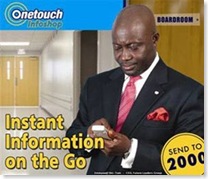Ghana Telecom (GT) staff has warned Ghana’s parliament that the telco needs Vodafone’s investment to save it from collapse, as they demonstrated in support of the partial sale of the state-owned operator to UK’s Vodafone.
 Employees of GT say the operator’s OneTouch mobile service is plagued by poor service and desperately needs network and equipment upgrades
Employees of GT say the operator’s OneTouch mobile service is plagued by poor service and desperately needs network and equipment upgrades
Parliament had met for a special assembly during its recess period to debate the 70 per cent divestment of the government’s share to Vodafone, which had previously met strong resistance from opposition parliamentarians who argued the US$900 million deal grossly undervalued GT.
Chief manager and head of roaming at the incumbent, William Agyei, stated that the indebted operator needed a company with the financial muscle of Vodafone to survive the local competition, characterised by multinational players that were investing large sums in network rollout and improving service quality.
“I can tell you that if this deal fails, GT cannot survive for two years,” Agyei declared. “The government is investing nothing into GT as of now, but I can tell you that when Vodafone comes on board, even the 30 per cent shares to be held by the state will be worth far more that the current 100 per cent shares.”
GT staff prepared a petition to be presented to the speaker of parliament and each of its 230 members, urging the government to complete the deal with Vodafone or see the telco die.
Corporate communications manager, Gordon Wellu, added that GT was losing many corporate customers and its OneTouch mobile service was rated poorly by the National Communications Authority.
He also claimed GT’s billing and switching systems were inefficient and outdated, which led to revenue leakages, while spending on new equipment and spare parts was desperately needed to upgrade services.
Meanwhile hundreds of protestors including opposition leader and presidential candidate, John Evans Atta Mills, converged on the parliamentary building to dispute the agreement.
Sam Okudzeto Ablakwa, a member of the Committee for Joint Action (CJA), criticised the government for selling state companies without considering alternatives and said there was no guarantee foreign investment would produce positive results, citing the example of previously wholly state-owned enterprise Ghana Airways, which was privatised and shares sold to US company Ghana International Airlines and Ethiopian Airlines.





0 comments ↓
There are no comments yet...Kick things off by filling out the form below.
Leave a Comment